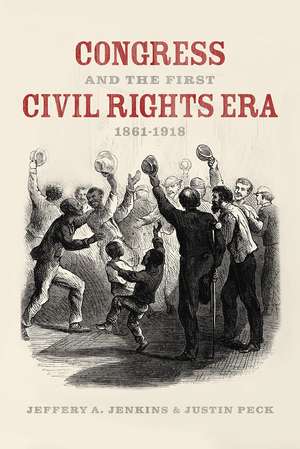Congress and the First Civil Rights Era, 1861-1918
Autor Jeffery A. Jenkins, Justin Pecken Limba Engleză Paperback – 25 mai 2021
The authors examine in detail how the Republican Party slowly withdrew its support for a meaningful civil rights agenda, as well as how Democrats and Republicans worked together to keep civil rights off the legislative agenda at various points. In doing so, Jenkins and Peck show how legal institutions can be used both to liberate and protect oppressed minorities and to assert the power of the white majority against those same minority groups.
| Toate formatele și edițiile | Preț | Express |
|---|---|---|
| Paperback (1) | 299.82 lei 6-8 săpt. | |
| University of Chicago Press – 25 mai 2021 | 299.82 lei 6-8 săpt. | |
| Hardback (1) | 666.54 lei 6-8 săpt. | |
| University of Chicago Press – 25 mai 2021 | 666.54 lei 6-8 săpt. |
Preț: 299.82 lei
Nou
Puncte Express: 450
Preț estimativ în valută:
57.38€ • 59.27$ • 47.75£
57.38€ • 59.27$ • 47.75£
Carte tipărită la comandă
Livrare economică 25 martie-08 aprilie
Preluare comenzi: 021 569.72.76
Specificații
ISBN-13: 9780226756363
ISBN-10: 022675636X
Pagini: 320
Ilustrații: 14 halftones, 10 tables
Dimensiuni: 152 x 229 x 34 mm
Greutate: 0.46 kg
Ediția:First Edition
Editura: University of Chicago Press
Colecția University of Chicago Press
ISBN-10: 022675636X
Pagini: 320
Ilustrații: 14 halftones, 10 tables
Dimensiuni: 152 x 229 x 34 mm
Greutate: 0.46 kg
Ediția:First Edition
Editura: University of Chicago Press
Colecția University of Chicago Press
Notă biografică
Jeffery A. Jenkins is the Provost Professor of Public Policy, Political Science, and Law, the Judith and John Bedrosian Chair of Governance and the Public Enterprise, director of the Bedrosian Center, and director of the Political Institutions and Political Economy Collaborative at University of Southern California. Justin Peck is assistant professor of government at Wesleyan University.
Recenzii
"Congress and the First Civil Rights Era, 1861–1918 is a detailed history of congressional developments during the era of Reconstruction, one of the most significant civil rights periods of U.S. history...The book provides no less than awe inspiring detail about proposals, bills, sponsors, debates, votes, and ever-shifting party alliances and disputes...Congress and the First Civil Rights Era is ideal for historians with the desire for an in-depth look at what happened step by step in Congress during Reconstruction."
"Jenkins and Peck provide a thorough legislative and policy history of congressional engagement with civil rights from 1861 to 1918. This history is so vivid and well-drawn that the reader cannot help but explore broader questions about the institutional and party politics of Congress. . . . By providing a deep analysis of our civil rights’ past, Jenkins and Peck raise inescapable questions about our legislative present."
"An intriguing, authoritative study of a centrally important period in American history. The book approaches a well-worn subject with fresh insight and a strong argument about how political divisions and the self-interest of congressmen can lead to tragedy. By expanding Reconstruction’s time line and delving deep into its moment-by-moment developments, Jenkins and Peck help us better understand this period and teach us lessons that can apply to current struggles over political self-interest and civil rights."
"Jenkins and Peck examine the fate of civil rights legislation during the Reconstruction Era after the US Civil War. They find that after an initial push, discrimination against African Americans in the South became commonplace, and civil rights advocates in Congress increasingly shifted to policies desired by white constituents in the North. They examine how the Republican Party slowly withdrew its support for a meaningful civil rights agenda, and how Democrats and Republicans worked together to keep civil rights off the legislative agenda."
“Written by outstanding students of American political development, this compelling policy history analytically chronicles the fate of proposals to enhance black rights from the Civil War to World War I. With an emphasis on the electoral connection and strategic choice in legislative politics, the book’s textured account of civil rights achievements and tragically missed opportunities underscores the interplay of party, opinion, and lawmaking and importantly adds to our understanding of how state formation and racial hierarchy came to be closely entwined.”
“Welcome to this book! It is the definitive account of policy making on civil rights across many decades. With deftness and in considerable detail, it shows the role of Congress. That institution’s well-known initiative during the 1860s gave way to the chronic offensive and defensive maneuvers, ups and downs (mostly downs), that carried on in subsequent times through World War I. All this came against an evolving background of public opinion, southern resistance, and partisan strategies. The long sad post-1860s history, told so well here, needs to be better known.”
